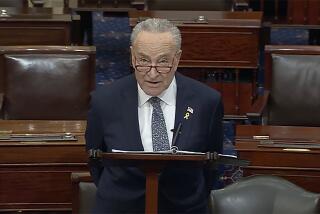GOP splitting over U.S. role in Libya and Afghanistan
Republicans are facing a widening fissure over the U.S. role on the world stage as party leaders decide whether to confront President Obama this week over his policy toward Libya.
House Speaker John A. Boehner (R-Ohio) and other congressional Republican leaders have said that U.S. involvement in NATO’s bombing campaign, which hit the 90-day mark Sunday, violates the War Powers Act. The House could seek to cut off money for the war as it takes up the annual Pentagon spending bill this week.
Several of the party’s potential presidential candidates have called for the U.S. to quit the fight in Libya and questioned the depth of U.S. involvement in Afghanistan.
Other Republicans have begun pushing back, criticizing what they see as a growing isolationist agenda within the party. The result is that Republicans, once relatively unified on foreign policy issues, now have a division that parallels the long-standing split in Democratic ranks.
The debate was on public display Sunday as two of the GOP’s leading figures on defense and foreign policy, Sens. John McCain of Arizona and Lindsey Graham of South Carolina, criticized Republican presidential hopefuls and congressional leaders who question the country’s military intervention around the world.
“There has always been an isolationist strain in the Republican Party,” McCain said on ABC’s “This Week,” “but now it seems to have moved more center stage.... That is not the Republican Party that has been willing to stand up for freedom for people all over the world.”
Graham said on NBC’s “Meet the Press” that any debate over cutting funding for the Libya war would encourage resistance by Libyan leader Moammar Kadafi. “Congress should sort of shut up,” he said.
McCain and Graham also criticized former Massachusetts Gov. Mitt Romney, who’s leading in the polls for the party’s presidential nomination, for referring to the fighting in Afghanistan as a “war for independence” that the U.S. should leave to others.
“I wish that candidate Romney and all the others would sit down” with U.S. commanders “and understand how this counter-insurgency is working and succeeding,” McCain said.
Romney was one of several presidential hopefuls who, in last week’s Republican candidate debate, focused criticism on U.S. military operations in Libya and Afghanistan. None took the sort of hawkish positions that McCain advocated during his presidential run in 2008.
Rep. Michele Bachmann (R-Minn.), for example, questioned what U.S. interest is at stake in Libya. “We were not attacked,” Bachmann said. “We were not threatened with attack. There was no vital national interest.”
The rift among Republicans has been developing for some time but is coming into sharper relief as the wars become increasingly unpopular and as the election year draws closer.
The arguments became louder last week after the White House released its rationale for not asking Congress to authorize the Libya conflict under the War Powers Act. White House officials said the war is not covered by the act’s definition of “hostilities” because the U.S. is playing a support role and American military personnel are not directly in harm’s way.
Boehner, who is trying to balance the conflicting positions within the Republican caucus, gave a carefully worded answer on the subject last week, hinting at a possible move to cut off money. “The House has options,” he said. “We’re looking at those options, and my guess is … we may be prepared to move on those options.”
A move to cut off money for Libya could gain support both from the right wing of the Republican Party and antiwar Democrats.
The Republican skeptics about Libya and Afghanistan tend to frame their arguments in fiscal rather than foreign policy terms. The $700-million cost of the Libya operation has fueled their opposition to what Sen. Rand Paul (R-Ky.) called “an overreaching and sometimes unnecessary foreign policy.”
“Our current expansive foreign policies are no longer fiscally possible to sustain,” he wrote in an op-ed article.
At the same time, the GOP has a strong interventionist faction that has long opposed most efforts to restrain presidential power. Many prominent Republicans have argued for years, for example, that the War Powers Act is unconstitutional, a position Graham repeated Sunday.
Where the majority of Republican voters will end up is unknown. A Gallup poll last month suggested that 47% of Republicans wanted to bring the troops home from Afghanistan.
All that could make the issue tricky for Republican candidates, said Steven S. Smith, professor of political science at Washington University in St. Louis. “War-weariness is a real phenomenon,” he said. The feeling that the fighting is unending “feeds the sense of misplaced priorities that bends some Americans in a more isolationist direction.”
On the other hand, Smith said, “not knowing how Republican opinion might develop, this appears to be a dangerous issue for Republican candidates who have not made foreign affairs even a minor part of their campaigns.”
More to Read
Start your day right
Sign up for Essential California for news, features and recommendations from the L.A. Times and beyond in your inbox six days a week.
You may occasionally receive promotional content from the Los Angeles Times.








